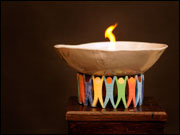Unitarian Universalism's two truths
What is our healing message? To what are we being beckoned when we gather?
So, to the casual eye we Unitarian Universalists are a Protestant church. But listen to the word preached, listen to the conversations in coffee hour, and something else becomes quickly, startlingly obvious. What is it? What is our healing message? To what are we pointing, to what are we being beckoned, within our gatherings?
Well, in a sermon at our General Assembly in Phoenix in June 2012, the Rev. John Crestwell proclaimed, “I am a First and Seventh Principle preacher.” I am a First and Seventh Principle preacher. I heard those words and I heard my own heart, and my voice and my life. I heard our message, our good news. When people come to the church I serve as minister, they will hear the good news of the First and Seventh Principles preached, explored, preached again, delved into, sliced and divided and examined, and preached again. And, I hope, ever more deeply lived.
First is our proclamation of the preciousness of the human being, of each and every one of us, as we are. You are good enough. You contain within who you are all that is necessary to love and grow deep and to heal your own wounds and the wounds of the world. This is articulated as the First Principle of our contemporary Unitarian Universalism: “We affirm and promote the inherent worth and dignity of every person.”
And the Seventh Principle grounds it and radicalizes it by proclaiming that this is so because we are all of us, each and every precious one of us—and every blessed other thing in this cosmos—united in a web of intimacy that is more deeply true than the blood coursing through our veins. This is the Seventh Principle of our contemporary Unitarian Universalism: “We affirm and promote the interdependent web of all existence of which we are a part.”
There is one thing more. We are about the integration of these two truths as deeply known and explored, manifest as a way of life.
Ours is an electric, dancing middle way between the two poles of our precious individuality and our intimate connection. But—and this is most important—not by splitting some difference, not being half individual and half communal. Our way is more radical. It calls for two 100 percents. Or perhaps it is better to say we are called to discover fully the one in the other. We are all about the individual and the fullest expression of that individuality, creative, powerful, even dangerous. And, we are all about our radical interrelatedness, where no one exists in isolation. We are woven out of each other, we are created by each other, one thing. Just this.
Following the way of these two truths and fully embracing what each means, and how each is dependent upon the other, opens a life that is dynamic, creative, and full of potential. And this is our way.
This is what we find as we come into our meeting places—our old New England churches, our modern sanctuaries, our rented halls. This is what we find as we gather together in our religious education programing. This is what we find as we open our mouths and sing. This is what we find in our coffee hour, and our chalice circles, in our committee meetings, in our work to feed the hungry, to clothe the naked, to find justice in our communities, and to heal this world.
This is why we gather.
This essay is adapted from a sermon delivered at First Unitarian Church of Providence, Rhode Island, on September 9, 2012. See sidebar for links to related resources.
Comments powered by Disqus







